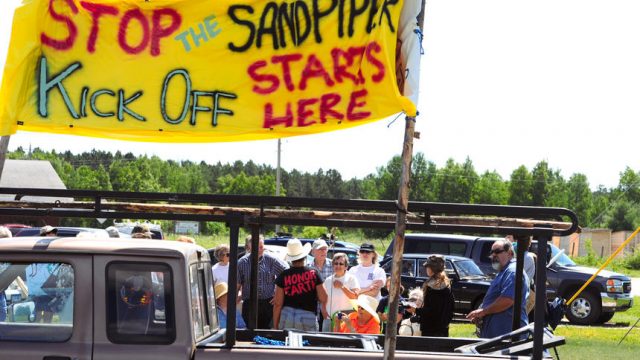We Can't Talk About Delayed Grain Shipments Without Talking About Delayed Pipelines

Yesterday the New York Times published a story about delayed grain shipments in North Dakota.
“The furious pace of energy exploration in North Dakota is creating a crisis for farmers whose grain shipments have been held up by a vast new movement of oil by rail, leading to millions of dollars in agricultural losses and slower production for breakfast cereal giants like General Mills,” reports Ron Nixon for the Times. “The backlog is only going to get worse, farmers said, as they prepared this week for what is expected to be a record crop of wheat and soybeans.”
That’s right. The rail backlog is hurting what is historically North Dakota’s most important industry, agriculture. But there’s something mission from Nixon’s article, which is the delays for pipeline infrastructure that have created such a bottleneck on our rails.
In fact, it’s hard to imagine how Nixon or any other reporter could write a story about grain-by-rail backlogs without mentioning that the problem has its roots in delays to oil pipeline projects.
There is probably no way North Dakota and the region could have avoided some level of rail backlogs. Oil production has simply grown too much, too fast, for transportation infrastructure to keep up. But things didn’t have to be as bad as they are now.
The Keystone XL pipeline debacle has been the most visible of the pipeline delays, and the impact on North Dakota’s situation is palpable. The Keystone XL would have been built for now were it not for political delays manufactured by the Obama administration, and it would have capacity for about 100,000 barrels per day of North Dakota crude.
Given that the average rail tanker holds roughly 1,000 barrels of oil, we’re talking about the Keystone project alone taking a 100-tanker car oil train off the tracks every day.
That would go a long way toward creating some rail bandwidth for all those grain shipments, don’t you think? According to the Times article, the Burlington Northern Santa Fe railway has a 1,336 backlog for rail car shipments. Canadian Pacific has about a 1,000 rail car backlog.
Those backlogs could be alleviated in about 3 weeks with the capacity freed up by the Keystone XL pipeline were it in place. In fact, we might not even have those backlogs were that pipeline operating.
And it isn’t just the Keystone pipeline. No doubt emboldened by the Obama administration’s endless obstruction of the Keystone project, environmentalists (led notably by Native American activist Winona LaDuke) have taken aim at the Sandpiper line which would take approximately 225,000 barrels per day (more than twice the Keystone XL capacity dedicated to Bakken oil) from Tioga, North Dakota, to Superior, Wisconsin.
If LaDuke and her activists get their way, this pipeline will never be built, keeping more oil shipments on rails which are a) less safe than pipelines and b) hurt farmers by creating backlogs.
To the extent that there is someone to blame for delays in rail service for North Dakota farmers, it’s President Barack Obama and left-wing activists who obstinately refuse to allow us to build pipeline infrastructure.




